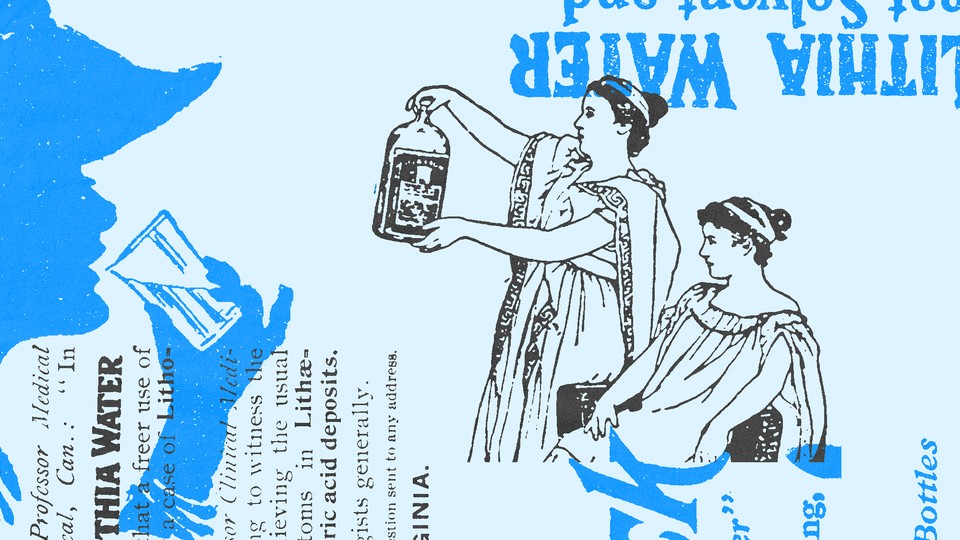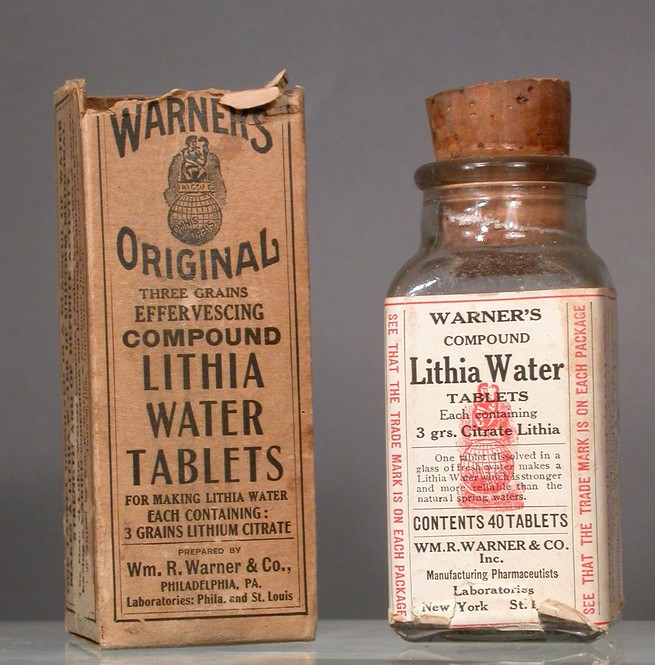Lithium Is Making a Comeback
6 min read
Of the first three elements to appear after the Big Bang, only one is available to buy as a bath soak. The Sads Smashing Anti-Stress Bath Treatment, which comes in shiny silver packaging, lists lithium as an ingredient and promises to take users “from weighed down to mellowed out.” It’s one of dozens of over-the-counter lithium supplements that claim to support a healthy mood. The metal is also an ingredient in Novos Core, a supplement marketed to “target the 12 root causes of aging,” plus in Life Extension, XtendLife, LifeLink, Youngevity, and AgeImmune. The anti-aging entrepreneur Bryan Johnson’s “Essential” multivitamin includes lithium too. “I am on a 1mg daily dose,” Johnson told me in an email.
Lithium, in other words, has become firmly entrenched in the wellness industry’s extensive library of supplements. But in crucial ways, it is unlike the other trendy products that dance across your Instagram stories. At higher doses, lithium is a powerful treatment for severe mood disorders—and preliminary evidence suggests that lower doses might improve well-being for people without mood disorders too. The problem is, American companies have little business interest in finding out how effective it really is.
If you put pure lithium into water, it will explode into crimson flames, but mixed with acids, lithium forms stable salts. Lithium compounds also dissolve uric acid, which doctors in the mid-1800s believed to be the cause of many illnesses. Physicians began using lithium to treat “a wide range of ailments, including headaches, diabetes, asthma, indigestion, obesity, skin disorders, rheumatism,” Walter Brown wrote in his book Lithium: A Doctor, a Drug, and a Breakthrough. By the end of the century, lithia water (water with a trace amount of lithium) was marketed as a patent medicine. (In that era, patent medicines—trademarked, proprietary cure-alls, many of which contained alcohol or opium—were a popular alternative to going to the doctor.) 7 Up was originally named Bib-Label Lithiated Lemon-Lime Soda, contained lithium citrate, and was marketed as a health tonic and hangover cure. Sears sold Schieffelin’s Effervescent Lithia Tablets, which were marketed for a variety of health concerns, including gout.

In 1949, lithium chloride, a table-salt alternative marketed to people with heart conditions, caused an outbreak of lithium poisoning in which at least two people died. The FDA, which had already started cracking down on patent medicines, quickly banned lithium in food products; later, researchers found that high doses of lithium can cause kidney failure, thyroid damage, tremors, and nausea. In 1970, the agency approved lithium carbonate for bipolar disorder; today, it’s also used off-label mostly for major depressive disorder. Then, in 1994, the FDA created the category of “dietary supplements,” which it does not evaluate, ushering lithium—mostly in the form of lithium orotate—back into a patent-medicine-like gray zone.
For decades, scientists have debated whether the lithia-water craze had any truth to it—if low doses of lithium might benefit a larger population than people with mental-health conditions, maybe even everyone. Some researchers think it’s worth investigating whether lithium is an essential micronutrient, like calcium or magnesium, with a recommended daily minimum of some yet-to-be-determined amount. Lithium carbonate is typically given at 600 to 900 milligrams a day for mood disorders. We get minuscule amounts of lithium from foods such as grains, potatoes, tomatoes, and cabbage. Depending on where you live and what mineral deposits are nearby, your tap water may also contain lithium. A 2024 review paper led by Allan Young, a psychiatrist at King’s College London, determined that most lithium orotate supplements on the market today contain a “micro” dose of 5 to 20 milligrams, and many have a “trace” dose of just 1 milligram. (The Sads Smashing Anti-Stress Bath Treatment contains 127 milligrams of lithium orotate, but it’s meant to be absorbed through the skin, not ingested.)
The effects of such low doses remain a mystery. Although a 2020 meta-analysis of studies from nine countries (including the United States) found that higher amounts of naturally occurring lithium in tap water are indeed associated with lower suicide rates, studies from places such as Switzerland and the East of England have found no association. In a 2021 study of rural Argentina, places with more lithium in their tap water had more suicides. Martin Plöderl, a co-author of the recent Switzerland study, told me that his team has found a publication bias in studies of lithium in tap water: Those with positive findings are more likely to end up in journals. Research into lithium’s effects on dementia, Alzheimer’s, and longevity has also been promising but inconclusive. A 2011 study of tap-water data from Japan found that the more lithium in the water, the longer people lived. Lithium consumption has been linked to longer life spans in flies, roundworms, and yeast, perhaps because it regulates molecules involved in metabolism and resistance to stress, Michael Ristow, a medical researcher at Charité University Medicine Berlin and co-author of the Japan study, said. A 2019 study found that bipolar-disorder patients who take lithium have longer telomeres—a proxy for lower biological age—than patients with other psychiatric disorders. And a more recent study from Japan found that people who took lithium for mood disorders had lower rates of dementia than similar patients who did not take lithium.
These data are compelling enough for Ristow, who told me he takes a low dose of lithium every day. Nassir Ghaemi, a psychiatrist at Tufts University School of Medicine, did not comment on his personal use, but told me, “I think it’s beneficial in people who are middle-aged and older, who have any risk factors for dementia.” To really be sure, randomized trials in humans are needed. Because lithium is an ancient element, however, it can’t be patented—only novel inventions are available for intellectual-property protection. In order to obtain a patent, a company would have to come up with some different delivery method or other improvement. Pharmaceutical companies, which are regulated by the FDA, therefore have little reason to fund an expensive clinical trial, especially when cheap versions are already sold over the counter. But supplement companies have incentive to sell lithium OTC without conducting rigorous research on its effects. Zero clinical trials for lithium orotate are currently registered in the U.S., despite its widening market availability.
Scientists don’t yet know whether lithium-orotate supplementation would yield different results than lithium in tap water. Only two studies on such supplementation have ever been conducted in humans—one from 1973 and one from 1986—and they have small sample sizes and no placebo groups. “Given lithium does work at least for preventing bipolar disorder, it’s a scandal that we don’t know how it works,” Young told me. If low-dose lithium remains akin to a patent medicine, Americans could miss out on understanding how and how well it works, and if taking it comes with any risks. In at least one case report from 2007, a woman took 18 tablets of a lithium supplement called Find Serenity Now at once and went to the hospital after vomiting. She was discharged with no other serious issues, but the risks of long-term use simply haven’t been assessed.
In the late 19th century, people such as Mark Twain and President Theodore Roosevelt traveled to Lithia Springs, Georgia, to drink lithium-rich water. The springs’ appeal endures: You can order water from its website, which states, “Locals have always believed Lithia Spring Water flows from the fountain of youth.” Lithium predates human life, is extracted from stone, and can have a profound impact on a person’s emotional life. No wonder it tempts our never-ending desire for some primordial cure-all, whether it be found in a groundwater spring or in our very own bathtubs.

When you buy a book using a link on this page, we receive a commission. Thank you for supportingThe Atlantic.



